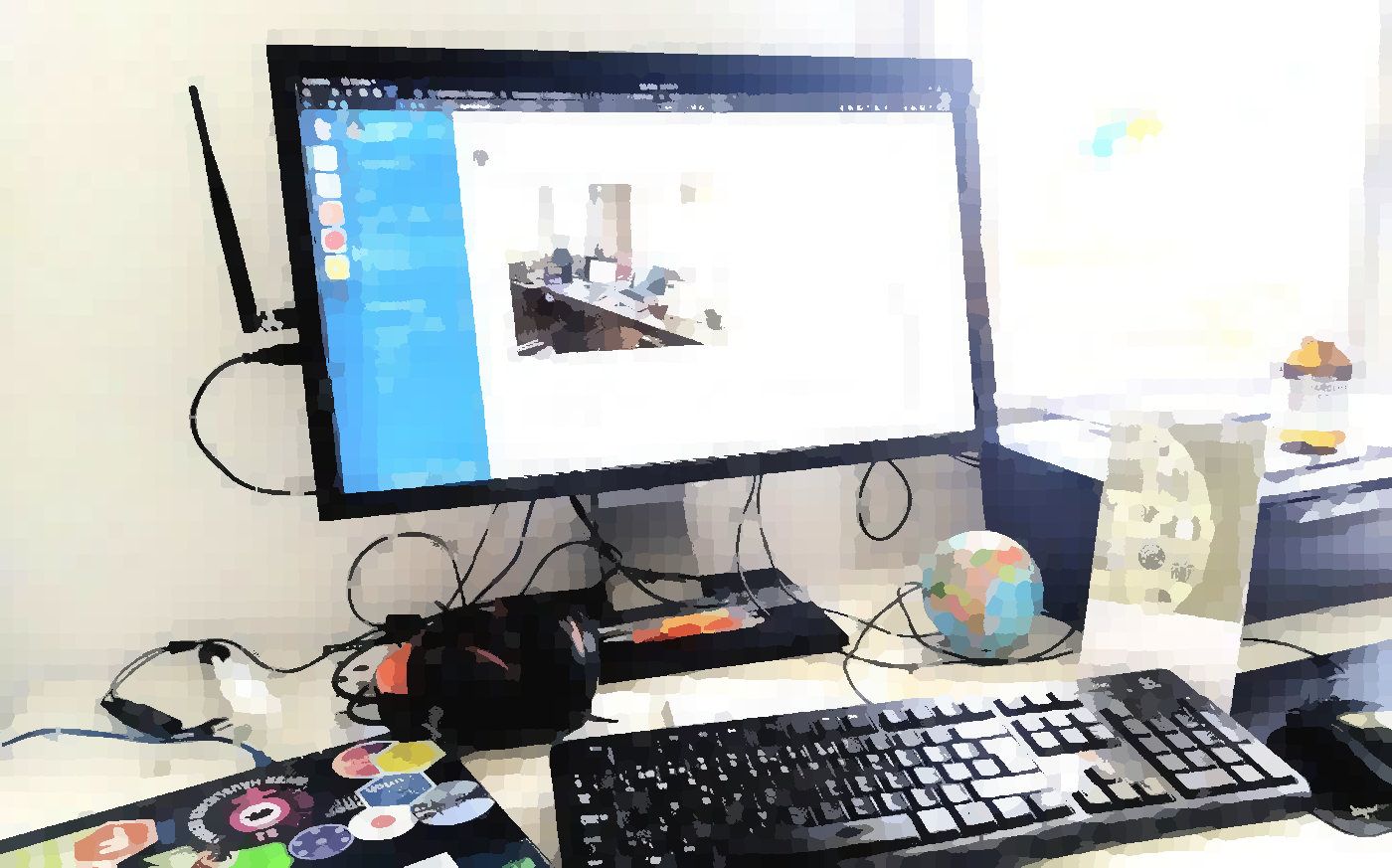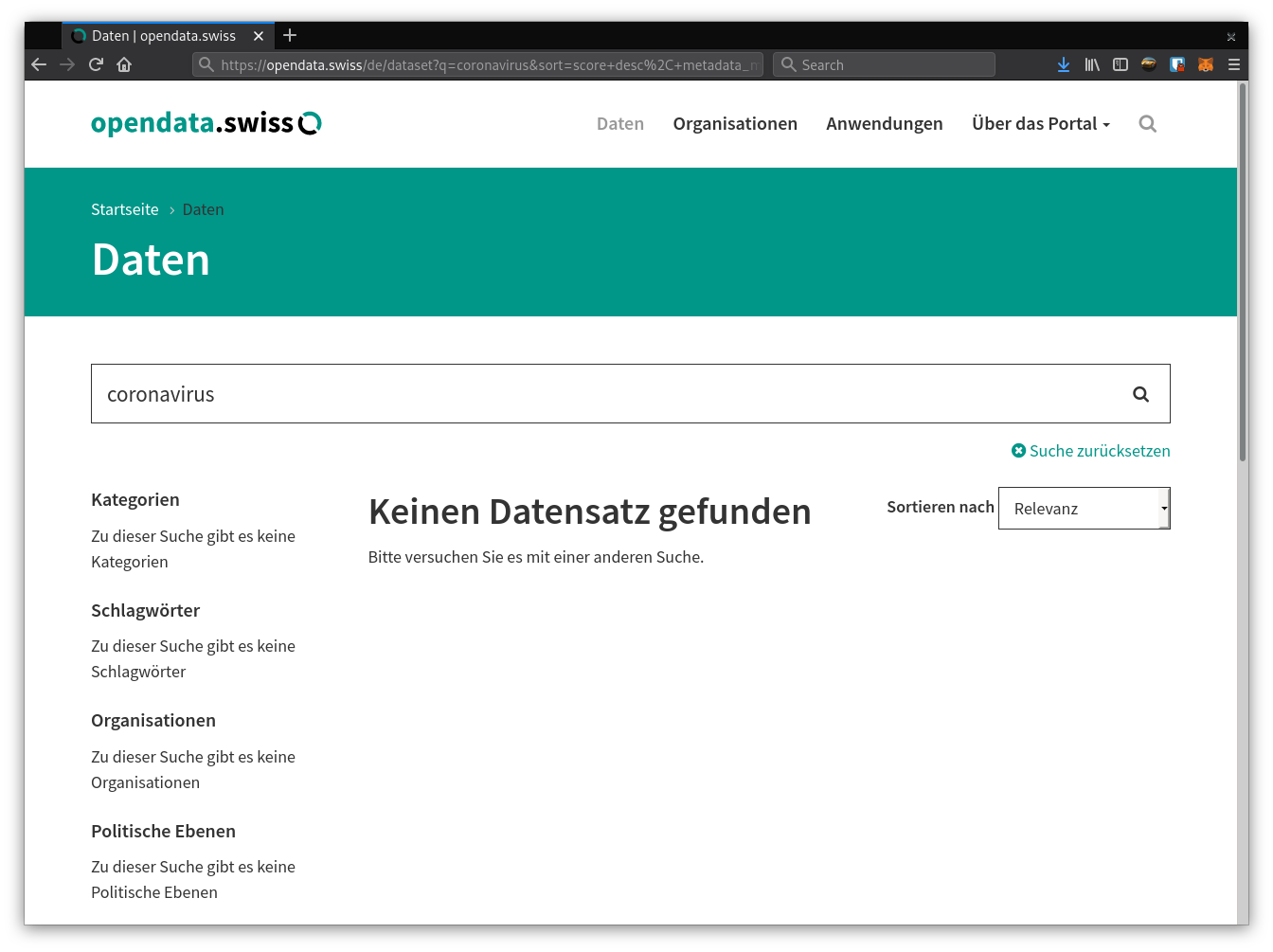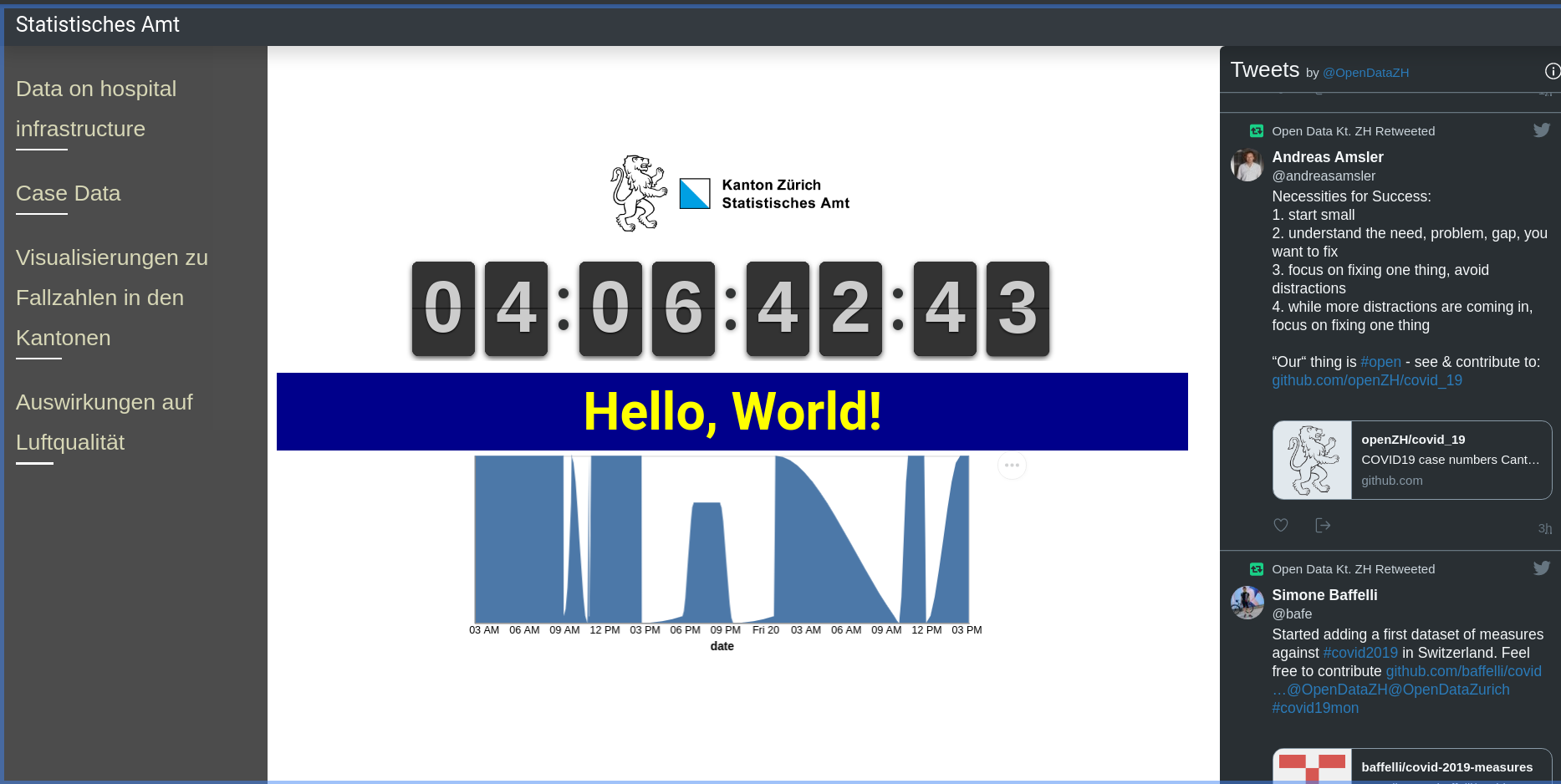068 #covid19mon
Monitoring COVID-19 Effects in an open data remote workshop, where over the course of seven days the participants contributed to a range of datasets to analyse the pandemic.

In the ongoing pandemic, politicians, authorities and media base their assessments on data. Improving the quality of base data was the goal of the project "Monitoring COVID-19-Effects". The Statistical Office of the Canton of Zurich worked with activists in the Swiss open data scene to process data from the health system, the economy and society and to make it openly available. In a virtual hackathon, our nearly 50 participants developed several sub-projects and contributed to a range of datasets.
This post was co-authored with Matthias Mazenauer from the Statistical Office, available in the original form here. Thanks to Corinne Roth Vock for editorial review.

A little more than a week ago, the Federal Council decided that the schools in Switzerland - one of the countries most affected in the world - will be closed. At that point at the latest, it was clear that the COVID 19 pandemic would also have a profound impact on coexistence and the economy in the country. In order to make the effects on society visible and at the same time provide politicians with a basis for decision-making, data from authentic, official sources is needed.

On 4 March, not a single data set on the Coronavirus or the COVID-19 pandemic was yet to be found on open data portals. The Statistical Office of the Canton of Zurich and its specialist coordination office for Open Government Data quickly set themselves to creating an open data basis and standard available to everyone across the nation.
Cooperation with the open data community
Public statistics specialises in providing high quality, broad-based and very reliable indicators to enable informed policy decisions. In the current situation of a public health crisis, the classic indicator systems of official statistics are reaching their limits. The situation is very dynamic, and changes daily or even hourly. It is important that those working in the health care system and in basic care are not bothered by surveys. What is needed is quasi real-time data from the health system on case numbers and hospital utilization, on the economy and society.

Especially in times of crisis, the cooperation between public statistics and the Open Data Community is a great opportunity to provide reliable data as quickly as possible. In order to avoid a blind flight, politics, administration and also the economy depend on timely and high-quality information on the current situation.
Data in demand
On March 5, the first data set on COVID-19 case numbers was published by the Health Department of the Canton of Zurich on opendata.swiss, the federal government's central open data platform. A swift response from the community proved how great the need for data on the crisis is in research and among the public.
A few days later the Statistical Office made plans for a "Monitoring COVID-19 Effects" hackathon. With support from data activists and utilising the platforms we've built around our previous events, we quickly went from idea to implementation and on March 17, announced a call for participation.
An alle die Datenliebhaber*innen da draussen:
— Statistik Kt. Zürich (@statistik_zh) March 17, 2020
Ihr seid grossartig ❤️ Danke für eure Unterstützung. Um die vielen Hilfsangebote für alle nutzbar zu machen, starten wir ab sofort den <Monitoring COVID19 effects> Hackathon!#covid19monhttps://t.co/HLm9rFKtXQ
Within a very short time and without further advertising, around 50 participants got involved in obtaining the urgently needed data basis for overcoming the crisis and analysing the first indicators of its effects. The hackathon was conducted completely virtually while advocating social distancing.

Individual tasks (challenges) were advertised on the hackathon web application powered by Dribdat. Participants could take part in one or more challenges and suggest solutions, connecting to each other and building teams online. Their open cooperation and remote work was supported by members of the association Opendata.ch. The challengees and participants subsequently developed their projects on a range of open source platforms.
A selection of projects
At the end of a 7-day "sprint", each project was presented in a video conference. All of the submissions were about complete and careful data collection, analysis and visualization, with the common goal of collecting high-quality open data and making it available for further use in an optimal way.

Cantonal COVID 19 case numbers
Our goal is to create a common official OGD data set of COVID 19 cases of the Swiss authorities. The data are uniformly structured and regularly updated, and are available as machine-readable open-data resources. We want to achieve this goal together with the Open Data Community. At the beginning of the hackathon, case numbers for 20 cantons and the Principality of Liechtenstein were missing. In the meantime, data on all cantons can be published at regular intervals.

Visualization of case numbers in the cantons
We try to discuss the various illustrations of the collected case numbers of the cantons here and improve them together. If you have ideas for a visualization of these, you can build on this source. Furthermore, we would like to have a discussion about responsible data visualization.
Evaluation of control measures
In order to be able to compare the effects of the measures taken to combat the pandemic, an overview of the measures taken per canton is required. This project aims to collect the basics and make them available to a broad public. These data will be of scientific interest over a longer period of time for epidemiological studies.

Data on hospital infrastructure
To provide models with meaningful parameters, we need detailed data on hospital infrastructure and bed capacities and utilization per hospital. This challenge aims to combine data on the capacities of the Swiss health care system from different sources to create an open and free data set.

Effects on air quality
Due to the emergency measures, a reduction in air pollutant emissions is expected. Although the effects are still minor due to the short duration and the strong influence of weather conditions remains visible, significant fluctuations in local air quality are measurable. We are continuing to monitor the effect.
For further information, check out these links.
Official Webseite:
https://statistik.zh.ch/internet/justiz_inneres/statistik/de/covid19.html
Hackathon Platform:
https://db.schoolofdata.ch/event/7
Wrap-up Presentations:
https://db.schoolofdata.ch/project/76
We have prepared a short survey for participants and followers, that should only take you 5 minutes and will really help us to plan how we can further help you, your projects, and the open data and open source resources you worked with ----> feedback #covid19mon

Thank you so much for your contributions and engagement. „A gift for future epidemologists“, as one participant expressed it. Today we pave the way for tackling the effects and supporting each other through this pandemic - and we are far from finished yet! Our collected and polished datasets are available to the world, and geared up for the next hackathon this weekends at #CodeVsCOVID19, and next week with #VersusVirus. Stay safe, stay home, keep at it.




